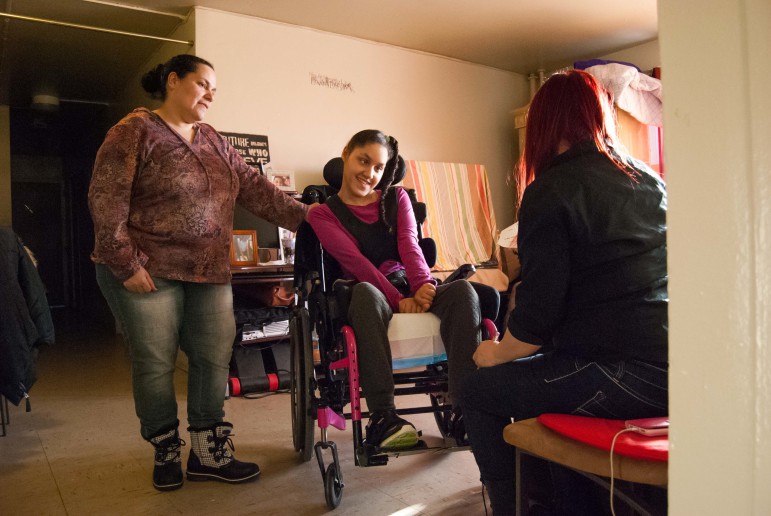
María Villaseñor
Haydee Perez and her daughter Anna in their Castle Hills apartment with Anna's home aide. They both have asthma and Perez said the mold in their bathroom can make breathing difficult.
For two days this winter, the school bus left without Anna Perez.
The elevators in her Bronx public housing development were out – again. Perez, 21, who has cerebral palsy and uses a wheelchair, was stranded in her 10th floor apartment, according to her mother, Haydee Perez.
“It’s stressful, especially when I can’t take her to school,” said Haydee Perez, 51. “She starts crying.”
Tired of waiting for repairs to their buildings and apartments, Perez and 19 other residents of the Castle Hill Houses filed a lawsuit against NYCHA in Bronx Housing Court April 3 charging conditions in the 14-building complex constitute “an emergency or danger to their life, health or safety.” The tenants hope a judge will force the agency to fix moldy bathrooms, leaky pipes, broken elevators, busted windows, and breakdown-prone heat and hot water systems.
The filing marks the latest legal action charging NYCHA with failing to adequately maintain its 334 developments, which house some 400,000 New Yorkers. In December 2013, the housing agency settled a class-action suit by agreeing to let a federal judge monitor how quickly it remedies mold conditions, which can aggravate asthma. Last month, lawyers for the tenants told the judge that NYCHA was not living up to its promises.
The lawsuit by Castle Hill Houses tenants came days after NYCHA scored $3 billion in federal funds to repair and bolster developments hit hard by Superstorm Sandy, and another $100 million in state funding, which Mayor de Blasio has pledged to match. As a condition of the state dollars, City Controller Scott Stringer will audit NYCHA’s handling of repairs and maintenance.
Meanwhile, tenants say they continue to suffer as open work orders for repairs at NYCHA building jumped by 40,000 between October and February to more than 124,000 – a marked increase, but still a far cry from a high of more than 400,000 reached in 2012.
“We feel like there’s something fundamentally wrong” with tenants living in these conditions, said Afua Attah-Mensah, director of litigation for the Urban Justice Center’s Safety Net Project, which represents the Castle Hill tenants. “Not only is it, we’d argue, unfair, it’s also frankly illegal. It’s a violation of the housing maintenance code.”
A survey of more than 200 Castle Hill residents conducted last fall by the tenant advocacy group Community Voices Heard tells a similar tale. Nearly eight in 10 tenants said mold came back after NYCHA made repairs, which usually entailed scraping off the toxin and painting over it, rather than addressing underlying causes, such as broken pipes or leaky roofs.
A NYCHA spokesperson declined to comment directly on the lawsuit, but noted: “We recognize billions in budget cuts on the federal and state level for public housing, coupled with the age and condition of our buildings, directly impacts the quality of life of our residents. NYCHA has made good progress in, and remains committed to reducing the volume of open work orders in our developments.”
Lillian McBean, who has lived at Castle Hill for 25 years and is a plaintiff in the new lawsuit, knows the frustrations of trying to get repairs done.
NYCHA changed the date to plaster her kitchen wall three times, McBean said. Then she was told she’d have to wait nearly five months for a painter. Meanwhile, the black mold in her bathroom is creeping back after being painted over a few months ago.
“We bust our behinds to work a job, pay our rent,” said McBean, 50, who works as a nursing assistant. “Our rent continues to go up, but we can’t get anything done.”
Castle Hill resident Zulieca Walker, 50, said for the past year her bedroom wall has repeatedly swelled and bubbled with black, smelly water from a leaking pipe. But she has yet to see a repair crew.
Walker and numerous other tenants said NYCHA workers often don’t bother to knock on the door. They just leave a ticket and report that no one was home.
“The tickets close themselves without getting fixed,” Walker said. “They want people to pay money, but they don’t want to do the job.”
Atta-Mensah acknowledges that NYCHA – which says it needs $16.5 billion to overhaul the 174,000 apartments it oversees across the city – has been systematically underfunded. But being broke isn’t an acceptable excuse for a landlord to skip making required repairs, any more than it’s an excuse for a tenant to not pay rent, she said.
City Council Member Annabel Palma (D-Bronx), who represents Castle Hill, said in an email that she supports the residents’ fight for timely repairs. For years, Castle Hill residents “have been plagued by mold, heating and gas issues, all stemming from the larger problem of an underserved infrastructure,” Palma wrote.
In the meantime, Haydee Perez prays for uninterrupted elevator service for her daughter.
“It’s an abuse,” she said of the conditions in the Castle Hill Houses’ 2,000 apartments. “I think it’s an abuse because every month I pay my rent.”
City Limits coverage of the Bronx is supported by the New York Community Trust.









5 thoughts on “Tenants Again Sue a Housing Authority Crippled by Federal Cuts”
Pingback: Tenants again sue a housing authority crippled by federal cuts | Allegra Abramo
Pingback: Tenants Again Sue a Housing Authority Crippled by Federal Cuts | Stop the Mold: Tracking the scourge in NYC public housing
Pingback: Neglect Takes Tolls On Tenants | New York City News Service
Pingback: Negligence Takes Cost On Renters | LaResistenciaDigital.Net
My business partners were searching for a form last year and encountered a business that has a ton of fillable forms . If others are searching for it too , here’s
https://goo.gl/P5OBaQ.